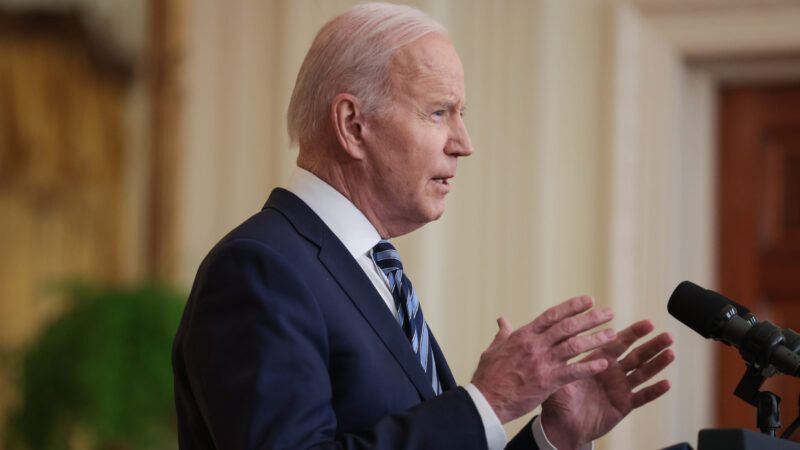Biden Is Right To Keep U.S. Troops Out of Ukraine
But there are still constitutionality questions surrounding his troop deployments to NATO's eastern flank.

This afternoon, President Joe Biden delivered remarks on Russia's invasion of Ukraine. He condemned Russian President Vladimir Putin's "unprovoked and unjustified" attack on Ukraine, calling it "a premeditated war that will bring a catastrophic loss of life and human suffering." Biden outlined a package of stringent sanctions to be imposed against the Kremlin in collaboration with Western allies.
"Putin chose this war," Biden declared. "He will pay."
Despite outlining strong punishments in the form of sanctions and frozen assets, Biden has set a bright line on just how directly the U.S. will involve itself in the fighting: "Our forces are not—and will not be—engaged in the conflict with Russia in Ukraine."
In the same breath, the president expressed that the U.S. would defend NATO allies "with the full force of American power" if Russia's military actions stray beyond Ukraine's borders. U.S. troops who were already stationed in Europe are being sent to countries on the eastern flank in order to reassure NATO allies. Though Russia has not attacked a NATO nation, the alliance says it "will continue to do whatever is necessary" to protect its members from aggression.
Biden is absolutely correct to say that there shouldn't be American boots on the ground in Ukraine. This isn't something the American public wants—according to a poll conducted by Concerned Veterans for America and YouGov, just 9 percent of respondents strongly favored the U.S. going to war with Russia following an invasion of Ukraine. Americans are tired of war. Having just concluded a 20-year mission in Afghanistan, it's no wonder. Recent presidents have been far too quick to enter the U.S. into far-off conflicts with unclear ties to national security interests and dubious justifications for involvement.
Compared to the involvement we could have had, stationing American soldiers on the territory of NATO allies seems prudent. But this isn't free of issues, either. As former Rep. Justin Amash (L–Mich.) pointed out last month, "Any effort by the president to enter U.S. troops into hostilities in Eastern Europe without congressional authorization" deprives "Americans of their right to be represented regarding whether their loved ones are sent to war." Congress has not issued a declaration of war, which is constitutionally required before a president may direct the U.S. Armed Forces. And under the War Powers Resolution of 1973, the president must notify Congress of troop committals within 48 hours and remove troops after 60 days if Congress does not approve an extension. Through the lens of these legal standards, Biden's troop-related actions are flawed.
Biden deserves credit for some of the stances he's taken to protect U.S. troops. He ended a war that killed over 2,400 American service members in Afghanistan. He's opting not to send American soldiers to Ukraine to stave off Russian aggression, realizing how lethal a conflict between two nuclear-armed global superpowers could be. These are difficult decisions to make in the face of brutal attacks that are endangering civilians—civilians the U.S. should welcome with open arms.
But the credit given to Biden should come with an asterisk. It's reassuring that his first instinct wasn't direct boots-on-the-ground intervention in Ukraine—but his current course of action should still concern anyone who supports more restraint and accountability in U.S. foreign policy.


Show Comments (72)